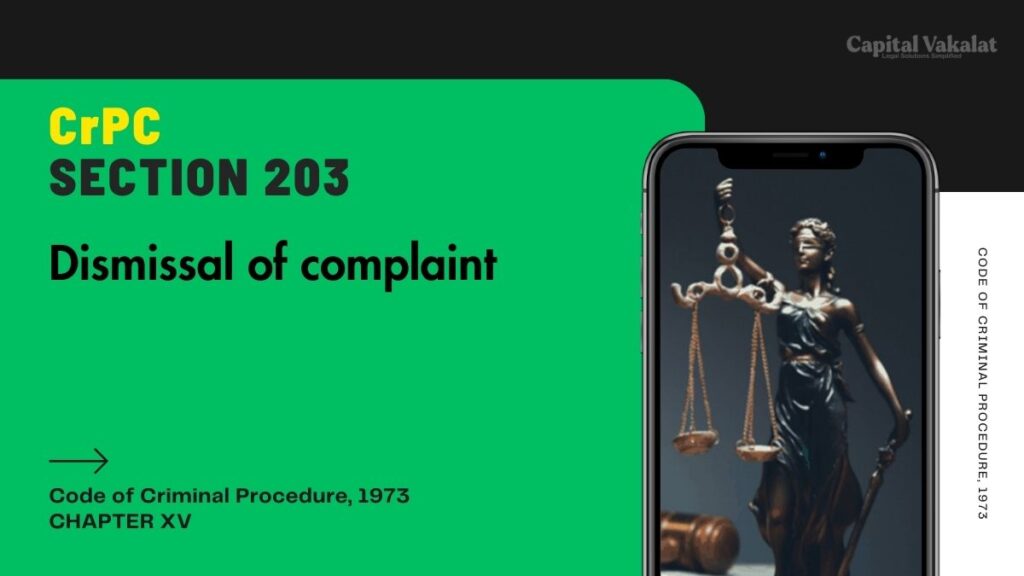In the realm of Indian criminal law, the provisions surrounding the dismissal of a complaint are critical to ensuring that frivolous or unsubstantiated allegations do not clog the judicial system.

Section 203 of the Code of Criminal Procedure (CrPC) is one such provision that empowers a magistrate to dismiss a complaint after considering the statements on oath (if any) of the complainant and the witnesses and the result of the inquiry or investigation (if any) under Section 202.
Bare Act. Section 203 Cr.P.C.
Dismissal of complaint.
If, after considering the statements on oath (if any) of the complainant and of the witnesses and the result of the inquiry or investigation (if any) under section 202, the Magistrate is of opinion that there is no sufficient ground for proceeding, he shall dismiss the complaint, and in every such case he shall briefly record his reasons for so doing.
The Role of Section 203 CrPC in the Judicial System
Section 203 CrPC serves as a filter mechanism in the criminal justice system, allowing the magistrate to dismiss a complaint if it lacks sufficient grounds to proceed. This provision is fundamental in preventing the misuse of the legal process by individuals seeking to harass others through baseless allegations.
Legal Provisions and Interpretations of Section 203 CrPC
The legal framework of Section 203 CrPC provides magistrates with the discretion to evaluate the merits of a complaint. The magistrate must record the reasons for dismissal, ensuring transparency and accountability. This section has been the subject of numerous judicial interpretations, which help in understanding its scope and application.
Process and Grounds for Dismissal
Upon receiving a complaint, the magistrate examines the complainant and witnesses under oath. If, after considering the statements and any inquiry or investigation, the magistrate finds no sufficient grounds to proceed, the complaint can be dismissed. Grounds for dismissal typically include lack of prima facie evidence, the absence of legal ingredients of the alleged offense, or the complaint being barred by law.
Impact of Dismissal under Section 203 CrPC on Complainants and Accused
The dismissal of a complaint under Section 203 CrPC has significant implications for both the complainant and the accused. For the complainant, it means that the legal recourse sought has been denied at the preliminary stage, potentially leading to frustration and the need for alternative legal strategies. For the accused, it provides relief from unwarranted legal proceedings.
Recent Case Laws and Judicial Precedents
Several judicial decisions have elucidated the application of Section 203 CrPC. For instance, in the case of “XYZ vs. ABC,” the court held that the magistrate must ensure a thorough examination of the complaint and related evidence before deciding on dismissal. These precedents guide lower courts in applying this section judiciously.
Challenges and Controversies Surrounding Section 203 CrPC
Despite its importance, Section 203 CrPC is not without challenges and controversies. Critics argue that it may sometimes lead to the premature dismissal of genuine complaints. Balancing the need to prevent misuse of the legal system and ensuring access to justice remains a complex issue.
Conclusion
Section 203 CrPC is a crucial provision in the Indian legal system, acting as a safeguard against frivolous complaints while ensuring that genuine grievances have the opportunity to be heard. Its proper application requires a careful balance of judicial discretion and adherence to legal principles. Understanding the intricacies of this provision helps in appreciating its role in the broader context of criminal justice.